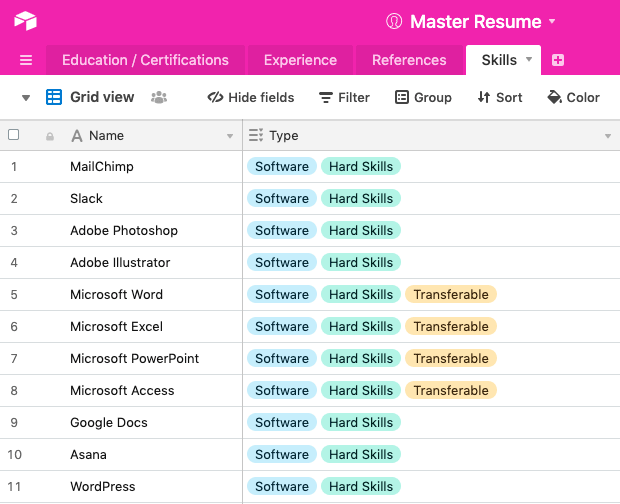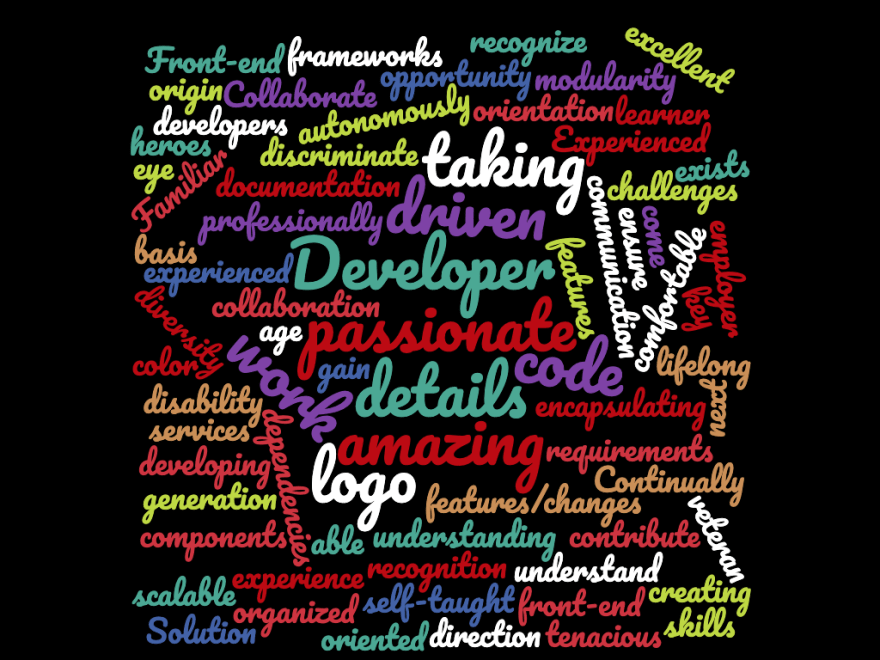My Best Tips for Creating a Career Change Resume and Cover Letter
Congratulations! Youve been searching and you finally found a job that seems perfect for you. Now its time to put your name in the ring for consideration. To do that, youll need a strong resume and cover letter.
Sounds stressful, doesnt it? Where do you start? What should be on the resume? What if you dont have any experience?
Dont worry! Once you understand a few things about the job application process and how to identify and present your transferable skills, youll be able to bang out a stellar resume in no time.
The important thing to remember in this process is to show, don't tell. Hiring managers usually have 100+ applications for any job opening, and they don't have time to connect the dots between what they need and what you offer.
You have to connect the dots for them and make it clear that you're the person they need. You need to convince the person hiring that you dont want any job, you want their job.
This article comes with two caveats:
Im in the USA, and Ive only ever applied for jobs here. Some of my advice wont apply to countries outside the USA.
The advice Im going to give you is subjective. Resumes and cover letters can vary widely depending on many factors, and a lot of it is my opinion based on my experiences. Im hoping to get you started, give you some ideas, and make the process a bit less confusing and intimidating.
So with that said lets dive in!
Transferable Skills
Since you probably wont have any formal development experience yet, youll have to focus on transferable skills.
What are transferable skills? Theyre things like communication, decision making, problem solving, listening, research, and writing.
These skills are not industry specific but theyre valuable to employers. Transferable skills show youre a dynamic, teachable candidate who can work well on a team and make positive contributions.
As an example, some transferable skills you probably already have that are important for development positions are:
- Communication
- Empathy
- Problem Solving
- Research
- Teamwork
- Organization
- Adaptability
- Listening
- Analyzing Information
- Attention to Detail
Now that you know what transferable skills are and why theyre valuable, do you feel a little more qualified for development jobs? I hope so!
https://www.macslist.org/career-happiness/how-to-leverage-transferable-skills-to-advance-your-career
Resume Types
Now that we know more about what transferable skills are and how they can help you in your career change, lets discuss resume types.
Chronological
A chronological resume lists your work experience by date from most recent to least recent. Chronological resumes are best for candidates who have previous relevant experience.
In general, chronological resumes arent appropriate for career changers. One exception would be if youre applying for a job in a very conservative or traditional industry such as banking.
Companies in these industries dont always appreciate creative resumes. However, each company is different regardless of what industry its in and its always best to research the companys culture thoroughly to decide which format to use.
https://www.thebalancecareers.com/chronological-resume-example-2063152
Functional
A functional resume showcases skills and abilities rather than your work history. These resumes can be great for career changers, but just like the chronological resume its best to research the company youre applying to thoroughly to determine how this resume format will be received.
Some hiring managers find functional resumes unclear with a lack of context. As a result, they can sometimes look like youre trying to hide red flags like job hopping or a lack of experience.
https://www.thebalancecareers.com/functional-resume-example-2063203
Hybrid or Combination
A hybrid resume is a combination between the chronological resume and the functional resume. In my opinion, its the best kind of resume for career changers because it focuses on transferable skills and provides enough context for hiring managers to get a clear picture of you work history.
https://www.thebalancecareers.com/combination-resume-example-and-writing-tips-2061951
Heres a few of my favorite resources for resume templates:
https://docs.google.com/document/u/0/?ftv=1&tgif=c
https://www.canva.com/templates/search/simple%20resume/
https://www.jobscan.co/premium-resume-templates
Creating Your Resume
To stand out and get an interview, you're going to have to do things that most of your competition isn't doing. That means customizing your cover letter and resume for every position.
I know it sounds like a lot of work and you're probably thinking you have enough hoops to jump through, but I promise you'll get more attention if you put the effort in to do this.
The Master Resume
One thing you can do to make this process faster and easier is to create a master resume. This document lists all positions youve ever had and all of your skills and education. Doing this will allow you to copy and paste the relevant skills and experience into a resume template and customize it in a snap.
I keep my master resume in a program called Airtable, but a spreadsheet or Google doc would work great, too!
Identifying Keywords
Some companies use whats called an ATS or Applicant Tracking System. They pre-program it with keywords and use it to filter out resumes that dont make the cut.
If you send off a generic resume to a system like this, a human is unlikely to see it. So how do we attempt to figure out what keywords the company is looking for and make sure theyre in your resume?
One strategy I like to use is a word cloud. I copy and paste the job description into a word cloud generator to get a visual idea of the most important details of the job.
In the example below, we can glean that the company wants a passionate, driven developer who works autonomously and pays attention to details. Are you that person? If so, great! We can now show them that in your resume and cover letter.
Writing Out Accomplishments
Two mistakes many jobseekers make when describing their relevant experience on their resume are:
- highlighting the tasks they completed, not what they accomplished, and
- telling instead of showing
As an example, I could describe myself as driven and self-directed. The problem with this is that anyone can say it. I need to prove with with an example.
If I just describe the tasks I completed in my past positions, Im not offering any value because most people have a good idea of the tasks you did from reading your job title.
Finally, always try to quantify your impact. How many? How much? When? Where? Quantifying your accomplishments adds context and helps the person reading your resume see how you contributed.
Do you see the difference between these two resume statements?
- Driven and self-directed
- Completed an online masters degree program in less than 2 years while working a full-time job
What about these two?
- Edited HTML templates
- Edited 15+ templates per hour consistently exceeding productivity standards of 11-12
Creating Your Cover Letter
Now that we have a customized resume that showcases our coding abilities and transferable skills, its time to focus on the cover letter.
Whats a cover letter?
A cover letter is a single-page document that provides more information about your background and reasons for applying to the job.
For career changers like us, its an opportunity to provide more detailed information about how were qualified for the position. We dont want to rehash whats on our resume. Rather, were going to provide specific information on why were someone theyd want to talk to.
You always want to try to address your cover letter to a person. These days its pretty easy to go on a companys website or on LinkedIn and find out who the position is likely reporting to. But if youve exhausted the internet and you cant find a persons name, its fine to use Team [Name of Company] or Hiring Manager.
Start with a greeting, tell them where you found the job, and show that you understand their needs:
Hi Team [Name of Company]! After looking at your website I understand you're in need of a [position title] with strong knowledge of [things theyre looking for].
Then explain what kind of work youre doing now and how it relates to what they need:
I'm currently a [your title] for [company], an [what your company does]. [Then a line describing what you do]
Example:
I provide student support and Slack community moderation in the front-end Techdegree program, where I debug code and assist students with the design and structure of their web development projects.
Then call out specific skills, tools, and technologies theyre looking for:
I love working with HTML and CSS, and most recently I sharpened my user experience design skills by completing the User Experience Design Techdegree program at Treehouse. Im also knowledgeable about JavaScript and I love working with Trello, Slack, and Github.
Add in those transferable skills:
In past positions, I've been highly regarded for my willingness to learn new skills, use creative approaches to solve problems, and patience/persistence when faced with challenges. Ive done my best work when writing and training were part of the job description.
And if you have specific experience theyre asking for, add that too:
As a lifelong learner and self-taught developer with 4 years of experience working remotely, autonomous, self-directed environments are where I thrive and make the best contributions.
Finally, add in a line about why you applied for their opening:
I enjoy the work Im doing at [Company], but Im seeking [what youre looking for in a job] because [why youre looking for it].
And finish with your confidence about how you meet their needs:
Im confident that Id fit in well with your team and that my skills translate to your needs.
And thats about it! Save a template like this in a Google doc and change the information based on the companys needs and you have a strong and personable cover letter ready to go.
To recap, in this article I talked about creating a career change resume and cover letter and I went through the following topics:
- Focusing on transferable skills
- The types of resumes and which ones are best for career changers
- Customizing your resume and cover letter for every position
I hope I gave you some resume ideas and took a little bit of the confusion and intimidation out of the process for you. Thanks for reading!
Original Link: https://dev.to/nicolepdev/my-best-tips-for-creating-a-career-change-resume-and-cover-letter-3ae4
Dev To
 An online community for sharing and discovering great ideas, having debates, and making friends
An online community for sharing and discovering great ideas, having debates, and making friendsMore About this Source Visit Dev To



